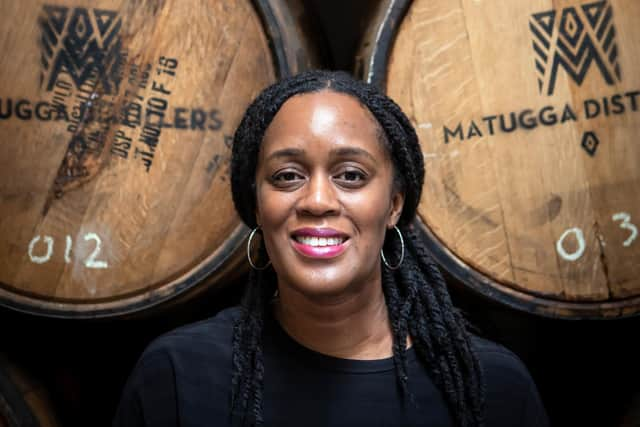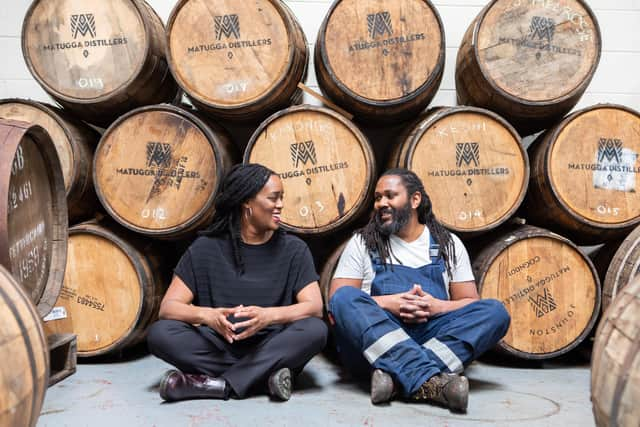The Big Interview: Jacine Rutasikwa, MD and co-founder of Matugga Distillery
and live on Freeview channel 276
Ms Rutasikwa, whose grandparents were part of the post-war Windrush generation who migrated from the Caribbean to the UK, runs the business with her Ugandan-born husband Paul. “There’s huge interest in Scottish rum right now and it’s a hugely exciting category," says the London-born entrepreneur, who has a background in marketing and television.
The artisanal distillery says it draws upon a rich “rum triad” – “rooted in Jamaica’s rum-making traditions, showcasing the culture and flavours of East Africa, blended with Scotland’s proud distilling heritage”
Advertisement
Hide AdAdvertisement
Hide AdThe firm, which says it has already sold more than 25,000 bottles through its online stores, as well as retailers such as Co-op, Master of Malt and French distributor Dugas, aims to take Scottish rum worldwide and has accelerated these plans by earlier this year serving up its first equity crowdfunding campaign, exceeding its target of £300,000.
Matugga highlights the Swahili proverb “pole pole ndio mwendo” – meaning “slowly slowly is the way to go” – in a reference to how your rum is made (and should be consumed), but the firm’s growth has been fast! Can you summarise its progress since its formation?
We were one of the early movers in UK-made craft rum. When we first thought about moving into the industry in 2014, the concept of rum being made from scratch in the UK was at a very early stage. We spotted a gap in the market for the creation of an artisanal rum that was directlylinked to our African and Caribbean heritage.
Matugga is actually the name of a town in Uganda where our family has a landholding – the land was lovingly toiled by Paul’s late mother. It started as a bit of a side hustle alongside our professional careers. Our rum was initially produced under contract manufacturing and we’d trade at weekend markets and festivals all over the country.


Advertisement
Hide AdAdvertisement
Hide AdVery quickly we saw the appetite for our products and decided to go all in. We relocated to Scotland in 2017, so Paul could undertake the brewing and distilling course at Heriot-Watt University and help us master the craft of distillation. We then built a distillery from scratch in an empty industrial unit in Livingston.
It was a complete step change for us, but we knew there was no going back, and we both embraced Matugga full time. It was both capital and time intensive and because we were at an early stage, there was a lot of learning on the job.
We made our first batch of rum in November 2018. That’s when things really changed. We weren’t just brand owners but owned the entire process from fermentation to distilling and maturation. We were starting to plant our flag in the market and were experiencing huge demand, but we were soon at capacity and we realised that to continue this growth trajectory, we needed external funding.
Because rum is growing exponentially globally, and because people loved our products, there was a real opportunity – we wanted to make sure we were able to take advantage of it.


Advertisement
Hide AdAdvertisement
Hide AdWe have been proud to help lead the way with Scotland’s emerging rum scene.
The business has just raised a six-figure sum via crowdfunding – what will this funding help you achieve, for example you’ve said you’re targeting export growth…?
The priority is to expand our production from four 200-litre copper pot stills to a single 2,000-litre still, and we must then turn our attention to ensuring we can distribute all the liquid we produce! The funding enables us to expand our sales and marketing team, while investing in strategic commercial activities.
We know there’s a real appetite for our product in France, East Africa and North America in particular. The investment enables us to maximise these opportunities. Paul and I have been in the weeds of the business since the beginning, but now have assembled the team that will allow us tospend more time working on the strategic priorities and future growth of the business.
Advertisement
Hide AdAdvertisement
Hide AdMatugga has praised Scotland’s “highly supportive” community, and you’ve had backing from The Scottish Food & Drink Net Zero Challenge Fund and been a Scottish EDGE winner, for example. To what extent has Scotland, which has a centuries-old rum heritage, helped the firm grow?
There is no question that being based in Scotland has been hugely beneficial. We’ve had access to tremendously supportive networks; whether that’s entrepreneurial peer groups, women’s networking forums, or the distilling community. There have been huge amounts of goodwill and incredible practical guidance.
We’ve been warmly welcomed to Scotland – from our local community in Livingston and indeed right across the country. I’ve found it to be very easy to make connections – if you have a strong idea, people are more than willing to help, and the openness is really refreshing.
You’ve been working with Gregg Glass, master whisky maker and blender at Whyte & Mackay. Can you explain more about this? What have you learned from Scottish whisky?
Advertisement
Hide AdAdvertisement
Hide AdHaving already taken part in several cask swaps, we are currently working on a number of collaborative projects with Gregg and his team. We’re very excited by the spirits we’ll be able to produce together.
Scotch whisky has played a key role in our distillery’s story. We’re as passionate and excited about the industry as they are and there’s so much we can learn from each other. It’s such fertile ground for us to seed and develop new projects together.
While the whisky industry is a much bigger entity than the rum sector in Scotland, it’s incredibly collaborative and people are so happy to work with smaller players to continue to make Scotland’s drinks industry such a powerful global force.
We are proud to build on Scotland’s incredible distilling heritage and we can bring provenance into our product through several measures – from our novel wild fermentation approaches to the use of indigenous oak in barrel-making.
Advertisement
Hide AdAdvertisement
Hide AdThere is pressure on us, as producers, because we’re representing Scotland, which has an incredibly strong legacy and pioneering present when it comes to spirits production. We absolutely refuse to make anything that’s average.
The African drinks market is “buoyant” but overlooked in the UK, you have highlighted. What should be done to tackle the problem?
I don’t think it’s a problem, necessarily, it’s an opportunity. It’s more about individual producers thinking about new potential routes for expansion.
More widely, if there is more diversity in positions of leadership, then businesses will have fewer blind spots and a wider field of vision. People gravitate to what they know. While some people may not automatically think of Africa as the most obvious opportunity, to us it makes complete sense.
Advertisement
Hide AdAdvertisement
Hide AdThere’s such a buoyant market there and it’s one we know and understand. In the future people will be thinking of Africa’s potential in the same way they
currently think of India or China.
In these times you really need to be very creative. While it’s uncharted territory for most, if you can crack market entry in most places, there are endless possibilities.
You hope the business can inspire other black entrepreneurs who have ambitions to scale up through investment, and you’re also a Women's Enterprise Scotland Ambassador. What would you say to anyone from a similar background to you thinking of following in your footsteps? Where are the biggest challenges?
It can be challenging for entrepreneurs who are ready to scale up their businesses but are new to the investment scene. Access to finance is critical for any entrepreneur wanting to take their business to the next level.
Advertisement
Hide AdAdvertisement
Hide AdStudies show that female entrepreneurs continue to experience gender bias when pitching for investment and founders from ethnic minority communities can find this even more difficult. It’s about being creative with your routes to capital – that’s why we went for crowdfunding because we felt it would allow us to really develop a dialogue with a wider prospective investment community.
We hope we can be a beacon to other entrepreneurs from diverse backgrounds who are wanting to do similar. Sometimes you just need one example to realise what’s possible.
Who inspires you, either in business or more broadly?
I’m inspired by the hidden stories of entrepreneurial spirit and community building. During our most recent visit to Uganda, we met with a businesswoman who had built an impressive craft spirits enterprise in her village with tremendous value – from mastering ancient distilling techniques and establishing a profitable distribution network to generating employment.
I am a voracious reader of entrepreneurial stories – you can learn so much from others if you find out what challenges they faced and the obstacles they overcame.
Advertisement
Hide AdAdvertisement
Hide AdThe distillery has diversified its revenue streams with the likes of tours, tastings, retail pop-ups and private cask investments – and it is developing a sugarcane plantation on family land in Uganda. What are Matugga’s key goals for the next few years – both on a corporate level but also social benefit?
We want to take our consumers on a journey of discovery in terms of understanding the possibilities for rum – we are showcasing its versatility.
As long as we stay true to our core beliefs and think of the product and customers first, then we believe good things will naturally follow.
In terms of the sugarcane plantation we’re developing in Uganda, where we will train local agricultural workers, it will be a huge point of difference for us – we want to help to protect the livelihoods of sugarcane farmers in the country while addressing our supply chain to make it as sustainable as possible.
Advertisement
Hide AdAdvertisement
Hide AdBy harvesting cane from our land and converting it into high-quality distilling molasses we will also become a genuine “cane to cask” rum producer. And we cannot wait to bring more exciting product development initiatives to the people of Scotland and further afield.
Comment Guidelines
National World encourages reader discussion on our stories. User feedback, insights and back-and-forth exchanges add a rich layer of context to reporting. Please review our Community Guidelines before commenting.